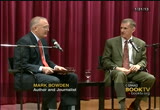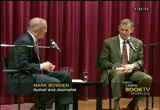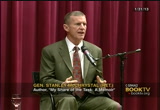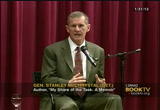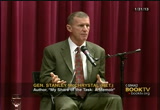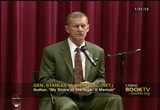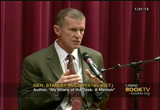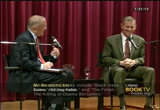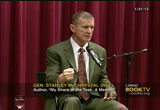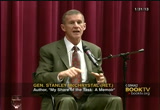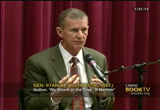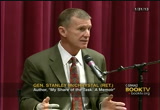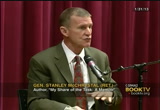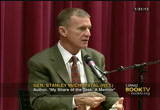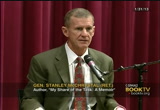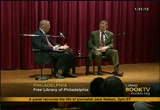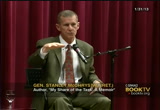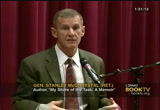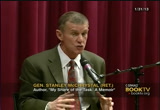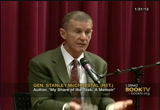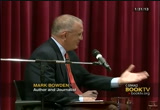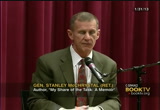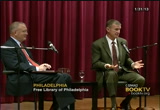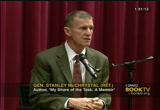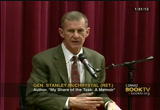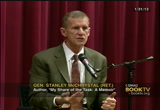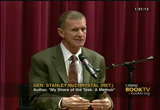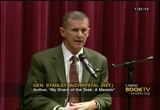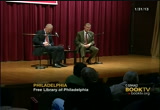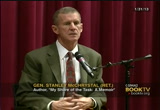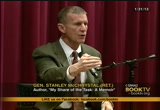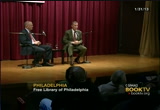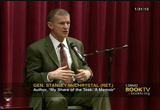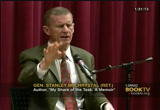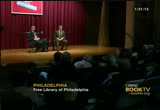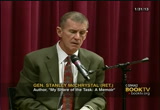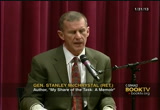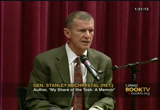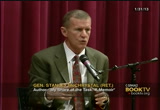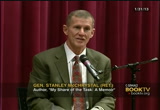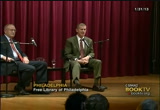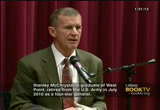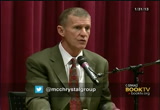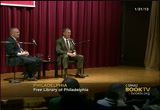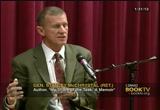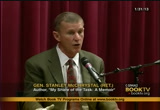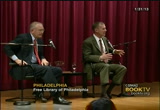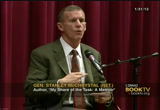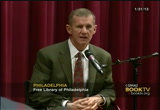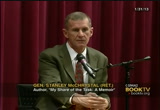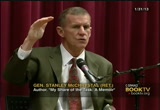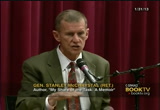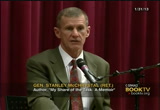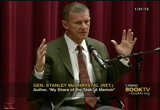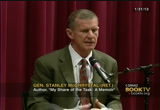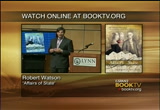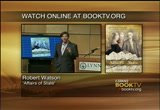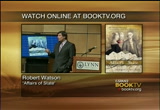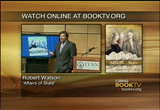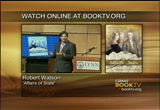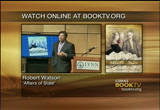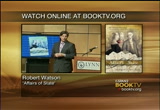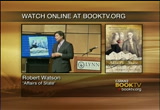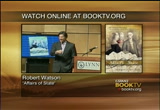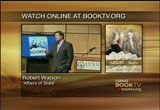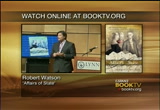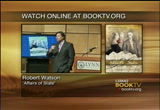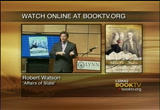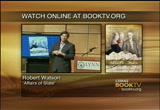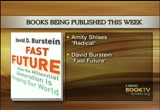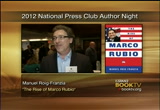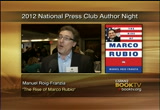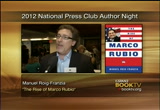tv Book TV CSPAN February 9, 2013 12:45pm-2:00pm EST
12:45 pm
programs online at booktv.org. and now general stanley mcchrystal discusses his book "my share of the task" with co-author mark bowden. former commander of u.s. forces recounts the major turning point in his thirty-four year military career which ended in 2010. this is about an hour. [applause] >> thank you very much, thanks for coming out. wonderful opportunity, the gentleman sitting next to me is kind of a big deal. for anyone who is -- pays attention to american foreign policy and military affairs you know that ever since the attacks on this country on 9/11 the united states has had to evolve
12:46 pm
militarily and in the intelligence community to meet the challenge of this new enemy and more than anyone i can think of, general mcchrystal has been responsible for shaping the evolution and developing what i call the targeting engine which is what we adopted as the primary method of defending the country. thank you for being here, great to see you. >> thanks for two kind introduction. i thought of you as a nonfiction writer but you have gone into fiction now. >> you were the commander of special operations in iraq and afghanistan and there have been a rapid evolution. i am familiar from writing blackhawk down the way things were nearly 90s. can you give us an idea of the
12:47 pm
overall strategy that has evolved and we will get to specifics but also the tactics you have developed? >> a group of people did. thanks. taking it back a little bit at the end of the vietnam war as america has done at the end of other wars special operations units that are created essentially get gutted or disbanded entirely. there's a bias to do away with them. >> host: 70s american special operating forces when i first joined the green berets were a pathetic shape. they were barely a shadow of what they had been in the heyday of the vietnam war. in 1980 the mission eagle call was launched to conduct a rescue mission into tehran to rescue american citizens who were held hostage in the index.
12:48 pm
at mcphail. rear not capable of doing great things. that was a complex endeavor. so it failed. from the ashes of that there was a report that recommended we take a look at our capability to do this kind of operation and the structured to do it. i entered special operations of view years ago as a ranger officer and i tell this in detail because you have to find stereotypical special operators, guys with big shoulders, big knuckles, but shots, brave and all that sort of thing. they important. you got to have that but it is the easiest part of creating the organization. what you have to do if you are
12:49 pm
going to do complex operations you have to have a huge intelligence capacity and integrate that with operators and have aviation ability to bring this together and most importantly you have got to have a culture and that culture has got to be very mature. that is the use i work very carefully. is not a culture of stereotypical rambo kind of things because that is not the way special operations succeed. that is how you lose. you have to build a culture that has evolved problem-solving and problem solving in which building teams does that. we went to the first -- i was in the rangers and joint special operations command for the first gulf war where we did hunting for iraqi missiles in western iraq and we were getting better at what we did. we all paid huge attention to what mark wrote about brilliantly in black hawk down. we went to school on that
12:50 pm
experience aided by what he had written on an operation that had gone very badly but had been essentially dealt with by the force on the ground with extraordinary courage but a lot of holes in what we do came out. we came out as a fairly brittle force, if everything went perfectly the way you planned it, you are in good shape but when things started the badly as they so often do how do you deal with it? do you have the resilience to deal with it? restarted to try to fix that and a kenmore flexible and resilient force. we went up into 2001 after 9/11 and the first operation in afghanistan toppling the afghan drive meant out al qaeda and degrades and iraq with the initial invasion the same thing, working against a nation state. where we found ourselves in late 2003 which is when i return to
12:51 pm
special operations. remembering spring of 2003 the invasion of iraq went surprisingly well deceptively well, and suddenly things in iraq started to go very badly in late summer. we had a sense that if we could arrest saddam hussein that would stop the problem and what happened was we did, the force found and arrested saddam hussein. what we found is what had grown beneath the surface with a cancer like network led by za a zarqawi had created al qaeda related organization, a combination of foreign leadership and frustrated iraqi sunnis and they were a network and not a small organization trying to do one of two things, trying to run an insurgency using terrorist tactics. suddenly the force that had been beautifully designed and honed to a fine edge, very precise but
12:52 pm
very episodic operations was not prepared and unable to see the water problem, it is like having a swat team for your police force for philadelphia but in reality if you can't cover the whole city would do a lot of things that one swat team can never be decisive and that is where we found ourselves, significant evolution, where we began to change. >> in somalia, the task force ranger had been there a month or two before the big battle that i wrote about and during that period they launched six so the path, the pace was intelligence gathering, finding targets, planning and operations, once that intelligence came together, launching a rage .
12:53 pm
describe what tempo means >> you get into and make a decision and set criteria to lunch when the criteria come. it is a pretty centralized, pretty deliberate process. when we got in iraq we were all originally doing that and have this precise thing and we found we were having an effect that very narrow affect, very slow affect and when we would go to pick up an individual that may or may not be a fight. if we capture him and his computer and his phone, capture all those things, but one of our small forces around the country would do the operation, might take a day or two to send the individual back to our headquarters where we could begin effective interrogation and the stuff that was captured typically go and plastic garbage bag and it would be written in arabic and it would come back
12:54 pm
and be 48 hours old before it got to the main headquarters and it would sit there and didn't have translators to do it. when we first took over we went in his room and it hadn't been read or exploited as we call it, digested for intelligent and counterinsurgency or counter terrorism is about intelligence. whoever knows the most wins. and so we had this incredible inability to digest information, process it and operate. we started to get where we could be a little faster and developed a system called fet e a for fine, fix, finish, exploit and analyze. that is a cycle you go through, find somebody, fix them in a location at a time now, finish by capturing or killing the, exploit whatever you capture, analyze that and learn from it. is a learning cycle, learning and inaction and we would do that and we would go through that process but it would be painfully slow because we are
12:55 pm
operating with different organizations, not all organic and different agencies, intelligence agencies and this may surprise you but not all parts of the government work together seamlessly. here we are in this cycle and we have these things, what we call blinks between the parts and one element would find a target but by the time the information got to the people who were going to fix it with a predator or something to make sure they are there, time would have passed and accuracy of information would pass and it would be passed over to the raid for again, you would have a loss like the game telephone where you whisper around a room and it is unintelligible by the fifth person. we are trying to do things in that system, this is madness and won't work. we started, went on a campaign to fix that process, bringing in different parts of the organization, building our intelligence capacity, giving ourselves a mindset that was
12:56 pm
different before and before, if each element did its part of the process to take great pride we succeeded and did what we were told and white that clean and said nobody is successful unless the whole process works. the definition of winning is the same for all of us only if we win this fight. that was different from what we had. by the summer if things got really bad starting in late march of 2004 in iraq when the country basically melted down and we started operating as hard as we could and operational tempo, how fast you can operate and we realize the size of the network that we were going to have to hit it all live and we were not going to be able to hit it once a month and by august of 2004 we got 18 raise a month for what every other night and we thought we were moving at warp speed, literally we thought this was the most amazing thing we
12:57 pm
have ever done, we are the most efficient and effective special operations task force on the face of the earth, we were, but we bristol losing. we came to the conclusion that we got to speed of more and there had been a fixation and just going after senior leaders, high value decapitation. we started that if we got zar w zarqa zarqawi, but think of any organization, if the key person is taken out does it get worse? i worked at the pentagon, it would have been a lot better. we realize you got to go after the people who do the work, people who do logistics', communication, pass information, build car bombs, communicate, take those out so we came up with a strategy. i used to tell people it is like rocky balboa and apollo creed.
12:58 pm
we hit them in the midsection and it them aloft. from august of 20 . from august of 2004 when we did 18 raids, we doing 300 raids a month, ten a night. every raid guy on the force is going on one raid every night. every pilot is flying one or two raids every night. these raids are not patrols. these are going in the door, someone is getting shot. extraordinary. to do that you can't use previous systems. you have to bring in intelligence on an industrial scale, we got to the point where instead of plastic bags of information on a target we would start to exploit their computers and biometric data, it would be
12:59 pm
pumped back to west virginia from the target to see if we ever had that person before and if we ever had any dealings with him, we would move the documents back and send them back to multiple places in the u.s. and everybody would be analyzing at the same time and we would be trying to turn this to learn as quickly as we could and we got to the point that we could hit three targets a night from initial intelligence. we would find joe smith at 9:00 at night because we had been looking for him, we would find out from what we got on that target about john doe we might hit that at midnight and it another at 3:00 in the morning and the reason it was important to go fast was terrorist networks repair themselves very quickly. as soon as if we were terrorists as soon as mark is captured pretty soon i am going to hear about it and the first i do is move my location and change all those connections we have and
1:00 pm
call it cut outs and moved to repair is also you got to be quicker than they can repair themselves and quicker than they can promote new people to develop new leaders and overtime with started seeing the relative age of leaders of al qaeda and iraq go down. .. moves intelligence analysts up into your base, integrating everything up front. can you talk about that and the
1:01 pm
role that technology plate. >> there are several things and technology that change of a fight. one is obvious, predators' commend it was not strikes but surveillance because you put a surveillance that gives you full motion video meeting anywhere in are forced to include as on the ground could watch what the predator is watching in full-time video or real-time video. the real effect of that caliber it used to take 120 people to raided targets were only 20 were going inside a takes hundred to secured outside, if you can do it from the air you only send 20. now the other hundred can hit five other targets, so we could hit six target than the time we used to it one. also, you can put a drone over and watch people all the time. if we decided to watch someone in this from all the time pretty
1:02 pm
soon do we know what you call a pattern of life, where you go, you hang out with to what you do, with the regular bad or involved in the insurgency. you can build up this. -- this knowledge. suddenly you're very precise. the search and know a lot. that is one technology that dramatically changed it. the other was night vision. you could, of course, see in the dark. in firefights you're absolutely dominant because we put laser aiming said some of our weapons, so in a fight against the enemy at night there not as well-trained, but we had this incredible -- incredible dominance. fire freights, our ratio was a thousand to one in terms of people getting it back. the problem is we don't have that many guys, so the ones known to up and every time you lose a person it is a huge cost because they're so well trained.
1:03 pm
still, dominance and the willingness to go places and do things that you would know the wives. the other one that is less obvious is the ability to communicate. did you teleconferences and not so much radio but video teleconference. we did use radius, but for example, we would take all of our ready and that's happening on the ground, pick them up and put them into our classified computer network system. so every -- wherever you were in afghanistan, anywhere, you could watch from above what is happening and you could listen to their radio and that's from our side down to the team level. no, welcome my kid micromanage. we didn't. we never micromanage, but you could reach an and you had the situational awareness which allows you to know what is going you could move medevac and do a
1:04 pm
lot of things that helps that quickly. the other thing that it does do is you're going to be effectively into an enemy network, you have to be a better network and they are. think what you're now working life is. the people in your church, community groups, your work, a combination of things and how you communicate with them determines often the strength of how you share information. you don't need to communicate as often. we started every day with a 90 minute video teleconference with the whole command, thousands of people. we pump information. we had a conversation about updates on intelligence, updates of operations, senior leaders. every day and won it with all the people, so everyone hears the senior leader in the conversations couple's separation go up and down, so we created will we call the shared consciousness.
1:05 pm
the effect is it decentralize decision making. if everyone does with the corporate leaders are thinking, they don't have to come up for decisions. they know what we're trying to do. we did not ask them to. i did not make tactical decisions, hit targets x or y because i wanted them to do that. i said, here's what we have to do in this area, create this affect kenwood defeat this network as we started to give or
1:06 pm
be -- we became a meritocracy. in one case you would see an operator communicating right back with a young analyst back in the united states or somewhere in the operation had occurred because of what the analyst said that in the operator is going, hey, jim, great job camino, all part of the team now. another case, you go into our forward headquarters of a gilroy and then see a big operator
1:07 pm
leaning over plywood table, everything in the command was plywood. they're would be a 22 year-old female analyst to weighed 98 pounds, and she has her finger in his chest saying, when you do is you have to have excess and he's taking it because it became a meritocracy. it was key because suddenly everybody of the problem. >> one of the things that you touched on in your book is the evolution of interrogation, which is a very hot topic, and you mentioned that early on there was the use of these enhanced interrogation methods. you evolved away from that. can you talk about that? >> how many people here have ever run a prison our interrogation facility? edison many we had in my command, and if you think about it come back to september 11th and the first response is what we do?
1:08 pm
we start capturing very serious terrorists. well, would bring the specialists said. there weren't any. so how do we do this? people go back to history books, manuals on how to interrogate, but most of the manuals that are written the military were designed to conventional war between two armies were you capture private acts of the soviet army in best of questions that is the way they were designed. we're talk about guys that are in a terrorist network in some pretty hard and people come as a we had to learn our through. the nation had to come to grips with how we feel about this. we are still doing it. it is an ongoing discussion, but if you remember, people jumping of the twin towers holding hands to their death, it was a different time and everyone wants to remember it now as we're sitting in philadelphia.
1:09 pm
i will remind you that in baghdad we were literally need deep in blood. it was unbelievable was happening in the torture chambers refining. against that backdrop and the backdrop of losing comrades we had to take our interrogation techniques and figure it out. originally authorized to use what they call enhanced techniques wycherley was not very dramatic. you could limit a detainee to four hours of sleep a night. you could make them kneel down in stress positions, and i don't agree with that, but that is the limit of "thereat. there was no beating people water bordering. but the nation had to come to grips with it, how we do this. a couple of things. first, we learned that the best way to deal to get information was long conversation, very respectful, very persistent, the individual that finally led us to the spiritual adviser, and
1:10 pm
they take this in great detail in my book, we had him for weeks, and at one. we had two primary in tate -- interrogators talking to him every day. they brought in his favorite movie and all three sat there together. it was the exorcist. but that is the way we did it. you just over time what you try to do is convince the person that they want to communicate and will do it for lots of reasons. sometimes because they're scared of being prosecuted with iraqi law and sometimes because they're boastful, sometimes because they're worried about their family, and there are any range of reasons, and terriers want to use whatever is there, but at the end of the day you have to convince them that they want to give you information. the problem with torture --
1:11 pm
well, multiple levels of problem with torture. the first is there is an academic argument of whether it works or not, the information is good and the answer is, i don't know. i have not tortured anybody, but is almost irrelevant. what happens in tortures you herself. the torture crosses a line and become something different from what you're raised to be an believe in. once you do that i don't think you can come back easily. the problem mr. you're dealing with people who are pressed for time. killing thousands of iraqis as well as many of our guys as well. you feel the press of time and you also see our comrades being killed and you see this extraordinary thing and say, i have to stop and the end justifies the means. you have to stop there. it doesn't because you corrode the force. the other thing that happens is, the worst thing that happened to
1:12 pm
us, what happened is, those pictures that came out, we all believe they were an aberration, and they were, but to many people of the moslem world were proof positive that america does that by policy, and we had thousands of young men come from north africa, syria, saudi arabia and other countries because they had seen and felt they had to charge for that reason. once they are and essentially we had to kill most of them, but there were empty upon a vision of something that that preconceptions about the u.s. and so if you let terror or if you let torture because of policy, that's what happens. you mobilize your focal mathematically increase your fellow immobilize them. so any information you get in my view is much less voluble than the cost of getting a. >> well, i guess you a thousand more questions. at the gare was share the
1:13 pm
wealth. this is on television, so we have speakers. we have actually amplifiers or whatever. wait for them to come given to you before u.s. question. aerostar with my friend. >> hi. >> should i stand up or does it matter? okay. >> get in the push a position. that would be nice. >> i'd never get through the question. >> that's the idea. >> you have said and written that you feel drove alone is evidence efficient policy. i wonder if you would talk about why you feel that and also, given the weariness in the united states of the afghan conflict and the ineptness and corruption of the afghan government, what do you think is the most effective thing that we could do and should do after
1:14 pm
toward facebook.com/booktv? >> sure. first, i think that an unmanned aerial vehicles are really important. extraordinarily good for american defense and let us do things we could not otherwise do, so the need to be part of a we do. that said to me if we issued a bunch of drones to the philadelphia police department and said go after the drug problem in philadelphia there would be able to figure out some drug dealers to issue some drug dealers with hellfire missiles and, in fact, they would be right in many cases. but if you think you would solve the drug problem, you probably would not, and in some cases you would make it worse because many people would experience the explosion even though they knew the person was a drug dealer. they would be offended by the fact that you would do that. put that in a sovereign country and suddenly you have a very
1:15 pm
effective tool that gets a perception of violation of sovereignty. there is a perception, even though the shot may only kill people who are absolutely guilty, the perception of everyone wearing away is that there are civilians there, noncombatants. and so very quickly there is the impression that the united states uses power with a certain arrogance. when that happens you lose potential support. a fire correct, and that maybe a little dated to about american popularity is not high. at what point it was below india which is impossible. but the people who are most upset about the drone strikes inside pakistan were not people in the waziristan region where most of the strikes occurred. they're in other parts of the country, so if they are outraged about the theory of it, but it is important because people lack the perception. i think we need to have that
1:16 pm
capability, use it, but we need to be mature about how we think about it. we need to think through our process because you create- forces with even well-intentioned positive things. it has to be balanced. >> the gentleman back here. we will was the second part? [inaudible question] >> the question is, with the war weariness on the part of the united states and the situation on the ground as it is in afghanistan what should our policy be? in the answer is i cannot give a perfect prescription intel and many troops ought to be there and how much money we got to spend. what i think is severalfold. people say we should not be in afghanistan. that is pointless. we are there.
1:17 pm
we would for our reasons. they did not invite as. we went because it met our goal to get rid of al qaeda. but we appended the taliban government and set the country in the free plate i think we develop some kind of moral responsibility for helping them set it right. third dimaggio's strategically at think it is in america and the world's interest to have a stable region. if america were to be completely unstable i think that pakistan stability would be very tenuous and they have challenges in the way, but i think it is important so my view is what we need to do is be consistent and persistent in the region. the reason people in afghanistan are so nervous is because in 2004 they think we're going to leave, and they have seen it happen before. in 1989 returned from the region. the intimate does not matter whether each individual afghan saw that, it has become commonly accepted truth that we left in
1:18 pm
1989, and they're starting to think we're just going to walk in 2014 and there will be nobody that they can rely on. they do not have other judges to catalyze. so what they're looking for in my view is the idea of all long-term should jiji partnership. i don't think that is a specific number of troops or money but the idea that you have an ally somewhere, and their fear is that -- a talked to president karzai one day and i ask him what he wants in future years. he says, no word about u.s. troops, one u.s. business, and i want you to be here making money . as said to me that's interesting he said, if you're making money coming 11 interested our stability. the furor afghanistan is there faraway, landlocked, don't make anything we need, and so we will carry.
1:19 pm
pakistan as many of the same feelings. once as of the region. i think there was in the region and what is to be consistent and stay there. their fear is that we will come in and pull out again in the pen things and cause issues. >> a vietnam veteran, and i have been in the peace movement of all last 30 years. our was also in december 04. of course there would allow the san. my question is the elephant in the room. i think -- i see our current military has dealing with the american people who pay their way as dealing in two very distinct modes, one secrecy and one public relations, and i see you as a master of one leg in each of those. you were the one star briefer
1:20 pm
for the press during the shock and dollar invasion. my question is, given the vast amount of secrecy that is necessary for the culture the you're evolving very brilliantly would concede, isn't it -- i mean, does it ever concern you have this -- what impact this has on democracy and the citizenship that really doesn't know what the heck you're doing? and to me is an important question, and that think it would rest in a sort of things that you do, and i wonder if that concerns your ball. >> sapphire understand your question right, and in many ways i where are you i have been in the peace movement for a long time as well. if i understand your question, you're worried about the balance between necessary secrecy in the wider secrecy because their is a
1:21 pm
certain amount of necessary secrecy. if you have a summer daughter serving then the essential information is given on their whereabouts or plans that become more vulnerable, and that is a real problem. if we have any desire to collect intelligence and the world from sources, people willing to give it, their identities and safety must be protected, so there's a requirement that is very real. it is balanced against your wider point which is really, are the american people informed about the policies? i don't know if you have read dale ellis burris book, secrets, back in 2005 when it came out, and he, of course ploy was the guy who copied the pentagon papers and propagated them out of there. it was an interesting book, and i had been a student of vietnam before that to about his basic outrage came from a after being part of the pentagon papers
1:22 pm
study is what it was he came to the conclusion that american policymakers were not stupid but had an analysis after analysis and kept coming to the conclusion that what they needed to do in vietnam was x but politically they were now willing to do that. there were only willing to do why, so there were following policy why cynically, knowing that the probability of success was low. taking a politically expedient route against what policy prescription actually said if you wanted to succeed you were going to have to do. so i thought a lot about that as we went through this command is a very difficult question test because u.s. yourself at each stage with the american people know, zero is supposed to tell and how much they're supposed to know. we struggle today with trying to explain something as complex as afghanistan and not doing it in an organized enough matter.
1:23 pm
if you go back to world war two, if someone could put up a map and you could show progress across the country, one comment would be hard to do for afghanistan because it is so complex. even when you're there you're constantly grappling with what truth is. i could go to afghanistan in red 15 stories and they would all convince you that afghanistan is in a disaster. they would all be true. i could read 15 stores that convince you that it is a tremendous amount of progress and a good thing. they will be true. the problem is, what is truth overall? and everyone wrestles with that. i did not see a lot of effort to deceive the american people. that did not see that. that did not see people trying to get things wrong. i saw some bad decisions. i saw people rustling with things that they felt near term political pressure or near-term media pressure. riyadh get up in the morning trying to get to that date. sometimes we go, we should have
1:24 pm
been talking about next year, and i saw some of that but it does see a lot of evil this. i did not see in that have not seen as effective a process for a truly informed debate on policy issues. a few months ago everyone was screaming we have to get into serious tomorrow and go save the syrians. whether that is right or wrong, i don't think it was well-informed his most of what i heard his people dying, so we have to go there. the responses to what side you're going to be on? yet to figure that out first. but i think it gets to your point. i am not a conspiracy theorist because i have been involved close enough to know that there aren't many conspiracies that work, and there aren't as many secrets as you take because most of them get leaked. they don't always get leaks completely accurately, but that is my experience. >> this gentleman in the back
1:25 pm
with your hands straight with the beard. >> general, when i was growing up the big concern was nuclear weapons, nuclear war, of mutual deterrence and that sort of thing, and that faded away with the dissolution of the soviet union. we still hear about the nuclear capability of so-called rogue nations and the constant drumbeat of what happens if they succeed or the north koreans have a weapon that to reach america. i am curious to know your perspective of where we stand in the nuclear arena in the world whether we have adequate defenses cars should we be worried of missiles from mockery of tomorrow or read about the israel attacking iran that these things in the news. >> i would be worried about it.
1:26 pm
i don't think that destruction of the world is anywhere close to where it was backed five men's to midnight, one minute to midnight in the cold war because you have the ability with the mass-circulation devil were there would then civilization as we know it. a building that is as likely now. however, i think what you have is you have nuclear pull of the -- proliferation of valley weapons but the technology and understanding of it. at some point it gets too irrational or irresponsible actors. the whole idea of nuclear strategy in the 50's, 60's iran 70's was based upon the fact that your opponent was a rational actor who had something to lose. the danger is when someone gets a weapon like that but they don't perceive that they have anything to lose. what everyone is scared about what north korea is erratic -- erratic. there is the concern. i think the thing about perot
1:27 pm
run is that they have been a very irresponsible, using people like lebanese, hezbollah, and of the surrogates and the president does not inspire confidence in the west. so there is this sense that they don't have to get destroy the world. all they have to do is get a few weapons. because of where they are and what they can do they can do irreparable damage to a small country like israel or to their foes in saudi arabia oil fields. what it has done is lower the threshold. they don't have to do as much, but if they did any of it it would be painful for the people involved. even worse is the next step, once you get beyond the nation's state the one thing good about the nation state is you have a geographic a place to go after if they act with their weapons. if it gets to a terrorist organization that all have one.
1:28 pm
they have nothing to all the risk. and so suddenly they can use it with complete irresponsibility, and they are. they will destroy the world, but they don't have to. we should be worried. with the nuclear and biological and chemical weapons are a threat. cyber weapons are coming into the same area because the barrier to entry for cyber attack is pretty low. you do not have to have a lot of stuff to go after someone cyber system, so we need to become more resilient and hardened. >> the gentleman in the suit. >> general, you know of our great capability. what happened in benghazi?
1:29 pm
>> i got a very classified briefing on it, and i can that share that. what have -- we really don't know. there was a brave ambassador with only seven americans and some local forces guarding it. what i saw of the attack, it looks like a very disorganized group of people who walked in. there was not an attack into the consulate area. they walk to an open gate. they did that even though the ambassador was there. they started a fire in the building in the happened to be in this safer man was killed by saved in elected from smoke inhalation. that part of it appears to not have been a very organized saying. could it have been somebody organizing? in execution they looked pretty organized. it could have been.
1:30 pm
it strikes me more as an emerging idea. let's do this. there is a later attack. i could not see a well orchestrated -- a well orchestrated attack. that did not appear to be one. there is a certain desire to say we cannot put our diplomats and service people in harm's way. if we can't do that we can be in the world the host nation won it. you can't build fortresses. we have to do we have to celebrate people, but we have the americans out there some will be harmed, the language, relationships, have a real interface with the world.
1:31 pm
the danger of creating this fortress mentality. >> good afternoon. they que. good afternoon again. do you think that we era rest of the same mistake we saw after vietnam and losing the expertise with this potential sequester and the possibility of losing special operations funding and the hardware and expertise of our special operators? >> it needs to come down a lot. the defense budget cut huge, and based upon the nation's finances
1:32 pm
we have to bring it down, but i think that process is already underway. people talk about defense and they talk about spending three or 4 percent of gdp. i think that is a dumb approach. we need to spend as much for offenses you need to defend yourself, but no more. the sequestering is completely different. sequestering is designed to be something that is so unpalatable the same people would never let it happen. what happens is now if you sequester in 2013 and you don't make a decision until early spring they only have the rest of the fiscal year to execute which means they have to take all these cuts, and there are a bunch of things that you cannot cut because they are contracted or things. next month to have to spend
1:33 pm
20 percent less or 50 percent less. you know that only 50 percent of your income is what you spend on food and that sort of stuff. you have your house, but you don't eat. that scared of what happens in sequestering. because you have to take it out of those areas where you have that ability. we stopped doing a lot of things that we need to do. if you're going to cut the defense budget consistently and carefully. it has to come belem. it just has to come them intelligently. >> third row. >> general, you certainly make war sound very exciting. level long-term peace activist phyllis so it's not easy to say
1:34 pm
that. my concern is the drones, and the drones, as marked out and is quoted as saying, are a terrifying tool. the ability to target far of individuals and places is a terrifying to. how can you condone the use of drums somewhat indiscreet early. they seem to be a political. decisions seem to be made unilaterally, and i think that is kind of inconsistent with our democracy. >> the very fair questions. i see it slightly differently. a delta bear in this card that we fired. the end of the process and that is carefully done. and the use test the questions. the you could do this, but you can't do this. if you're going to yoko somebody at the end of the day in a legal
1:35 pm
sense it doesn't matter. you kill somebody as opposed to using drone. there is a cultural part of the you're heading down. if you are a nation or a part in particular are warrior nation like jeff cassette or pakistan, that culture and somebody has technology that allows them to stand up the issue that you with impunity to their respective as a warrior. they don't think of you. this guy came up and took his best chance and he got me all right. they don't really respect the technology. their respective on one sense, but think you would feel if they knew there were groans of about you. it's a little bit -- you would resent this omnipresent to mark on the legal entity that can
1:36 pm
just region. and so there is a cultural part of it that we need to understand that really creates a lot of resentment of people. the other theory about more's the threshold. go back to 1998 and president clinton launched tomahawk missiles based on the intelligence from the embassies that were blown up in east africa. he launched tomahawk missiles into the sudan and afghanistan. and they hit targets to lend if you have as to any of us in this from the next morning whether america was the war, just that all of us would have said no. we fired some missiles, but we're not at war. if u.s. people is the impact of those, not missiles i think there would have a different view. so the danger is committed to a potentially lower the willingness to use force and nothing given as four. yet you build up entities, you
1:37 pm
build the people who think there are a war with you. when did al qaeda go to war with the united states? the average answer is september september 11th. al qaeda declared war in 1996. most of us did not get the memo. but they attacked the coal, east africa, they were at war with us, and there's always a danger when one side is the war and the other is not commend both ways. the danger of all of this technology is that cyber has the same potential. anytime you can sit back and relative safety and do something to somebody else -- now, if your son or daughter was going into the target area and you were going to spend a sleepless nights worrying about the you would have a different view of that mission. at least more connected to it, but technology has the danger of lowering the threshold and it
1:38 pm
can become politically easier to operate it without putting forces a risk which lowers it yet again. >> this gentleman and the front. >> two quick questions. take you for your service. you support or oppose the new secretary of defense and what is your criticism of american general's since world war two except for you and general patraeus? [laughter] >> i just finished the book. it is painful to read about generals being criticized because a lot of it is correct. i am guilty of that. then we had shortcomings of not being strategically enough minded. you get very focused and your job of your tactical part of a mission and not thinking the big, strategic problem.
1:39 pm
big criticism is not firing enough people. we don't fire enough other generals. that may or may not be a good criticism. it is certainly worth paying attention to. but it is a useful thing to throw out there. and so if he would take the job right now, out lesson. secretary of defense, think about it, they will go through this constricting budget, implement things like females in combat, which i agree with, but implementing it will be hard. it is doing to be a very difficult for years. i think that he has great background. the senate is useful. it's just gives you a context. you feel president obama is a
1:40 pm
good team. adelle much worry about his policy positions because he will be a policy maker. the president's policy will go. the fact that they feel that they can be a good team, to me that is the important thing. allows the president nominate somebody who is just unqualified , i tend to think a leader should get to they want. >> thank you. we have to stop well. [applause] >> we would like to hear from you. tweet us your feedback. twitter.com/booktv. >> i have been trying to find a new lens, a new way of studying presidential character. twelve years ago erodible, first ladies and thought that it would be important to understand the
1:41 pm
presidents from the different angle. when the study the person that did them the best. for example, what possibly could die as an historian contribute to the body of knowledge of lincoln or george washington? pretty much everything that could be you written probably has been written. the greatest historians have spent years poring through the letters and the evidence to produce his book of lincoln or this book in the hundreds of booker washington. my thought was when i looked at the person who knew them the best, the first lady be as historians have largely ignored the role of the first lady as they have largely ignored the role of mistresses. i suspect a lot of my colleagues and to be aldermen. most historians, as i always say to were not educated in matters of the heart or the hearth, so therefore they ignore that. cannons democrats instrument
1:42 pm
kings. focusing the first lady, the first thing thomas jefferson did after spending 17 days cooped up in a loft outside of philadelphia writing the declaration of independence the first thing he did is he went shopping for martha. he was preggers, miscarriage. but personal gloves. then he begged off from serving for the rest of that summer so they could go home to monticello to be with his wife. every winter car right there, martha washington. by studying the first lady's me give you insights of the presidents and other things. apropos to my book washington's closest adviser was alexander hamilton. one of a chapter starts about the history of womanizing.
1:43 pm
for example, bill clinton was not the first and not the look worst when it comes to this behavior in high office. along prolong history of it. and eliot spitzer, arnold schwarzenegger, out these guys had nothing by alexander hamilton. we find is if you read, for example, letters written by it martha washington she was tough, like a soldier, did not complain about the weather, did not complain about the harsh conditions, but she did complain about one thing. there was a tomcat warm winter that was misbehaving with all the lady cats and it was noisy. she nickname the tomcat alexander hamilton. all the young roes that would come into town. a few years ago, life of the white house. the presidents at ease. hobbies. fears and hopes.
1:44 pm
fathers and husbands. another rate of assessing presidential character. we are also trying to figure out dick nixon. for example, i looked and said nixon liked to boulogne and some palms were blacks it to do it. here does this? so i guess all books in the being trilogies. here is the end. here is the trilogy. affairs of state to might try to take a different perspective. for example, we all love of george washington, but we started washington in yorktown. brilliance. we steady his courage and dashing crossing of the delaware would save the revolution. who would george washington's girlfriend when he was a kid? and you find that teenage washington and more than one occasion basically go some in tears because he was turned down
1:45 pm
and puts pen to paper and writes roses are red and violets are blue to palms. he once wrote that cupid start has been shot through my heart when yet another broken into and out. this is a different look at washington. during my degrees and doctoral study by professors did not tell me about washington's teenage girl friends. so when this kind of fun and provides us with an important lens, a new way of understanding the presidents. we all know that our country's leaders have oftentimes been shaped by the hand of a woman, often the mother, often a wife, but i am here to tell you, some times that of the misters as well. it is in the news today as we tape this program, general david patraeus is still dominating the headlines with his alleged affair in business behavior. related to the book, what my first thought was when this happened and when it came out was during world war ii general
1:46 pm
eisenhower was having a long-term affair with an attractive young british driver named k. summers be. what general hires the and female model to be is a instead of the major her captain or medal winner. imagine if the affair with summers became out for a world war two and as happened with patraeus, what if we got rid of him before d-day? during the great depression franklin roosevelt was having affairs. he had two very long-term affairs. one of his personal aide and secretary and coke and dresser and un pressure apparently. what if we found out about fdr's miss the air your and what every pulled him out of office and demanded his resignation as the economy was recovering? all the way back to the french and indian war.
1:47 pm
very romantic letters to a woman sally fairfax, a very attractive , older, sophisticated neighbor. what of washington's letters have become public during the french and indian war or revolutionary war, much as patraeus is the milk became public, and what if we get rid of george washington? so bill clinton is of the first and not the worst. been there, done that. in fact, it pains me to say that even abraham lincoln visited a prostitute. say it is so. it happened. the details on that are sketchy. not a lot of letters written about this to about here is what we can piece together. lincoln's best friend was joshua speed, and speed was as dashing
1:48 pm
and hence of that lucky with the ladies as lincoln was allegedly home work and are in court and of like your romance. he felt sorry for lincoln. they called one another by their last names. speed did not have a place to stay. during the french, he was using the services of a professional woman. and you imagine lankan upstairs with a pillow over his head trying to mind his own business as he is doing his business. i have to have a woman. it's been too long, and here's what appears to have happened. only ever in lincoln would do this. asked for a letter of introduction. with a professional woman, and that don't mean agriculture as the oldest profession.
1:49 pm
will we piece together is lincoln visited a prostitute and had maybe $3 within which was a lot of money. but eliot spitzer money, but a pretty fair amount of money, and the press did apparently charges like ava box. lincoln says, i cannot afford it. i'll have three. there's a possibility he can pair when he has the money. will we know is either because either licking got embarrassed or is on rack up the best of them to you can pay me later this one is on the house, he ran out the door. so they say, when he visited a prostitute there should always be a happy ending. this is not from personal experience, but in this case it was a good ending. even abraham lincoln. what i thought i would do is
1:50 pm
tell you just a couple of my favorite stories that just about mistress's but presidential character. don't worry, they're urges the stories here. one of them involves our 22nd and 24 president, grover cleveland. now, there was a controversy because cleveland father did child of wedlock. the woman from pennsylvania and she might have been a prostitute . at the least she was very casual bell cleveland was a bachelor. running in the 1880's in the 1890's. fathering a child out of wedlock was seen as a big to do at the time. and there was such a big to do for other reasons. the republican opponents of cleveland very righteous
1:51 pm
preachers started a campaign that no woman in the country has seen. lock your doors. cleveland is prowling the streets debauching young women. an aggressive campaign attacking cleveland to missouri became a huge story because there would not let it go. one of the things that saved cleveland as it turns out that is why miraculously gave birth six months later. all this combination was being heaped on to cleveland and the one thing we dislike more than a politician that makes a mistake is a hypocritical politicians. it blew back on line and help cleveland. the other thing that made this a bit of a scandal was this. the republicans were pushing this issue and would have a little gentle, a little song, a line that there would do.
1:52 pm
mom, mom, where is my part? cleveland finally was the presidency by saying ma, ma, where is my pa gone to the white house, ha, ha, ha. best friend and law partner, it gone to new jersey and spent most of his career in buffalo. he had become the mayor and buffalo the york but was a very successful lawyer. there were law partners. and they practiced law together call went out together, there would go out drinking and eating together cover and it appears that they also ensure the services of maria together. has a son and leather knew who the father was. complicate things by naming the child oster cleveland.
1:53 pm
now, oscar had been married and had a daughter. cleveland was a bachelor, so he accepted responsibility to pay for the child to go to an orphanage. here is where the other part of the scandal comes in. does a few years later in the carriage accident he leaves a widow in the arrow. makes an enormous amount of money and takes care of the window and the arrow. pays for them, says the mob but unless all. best friend and former law partner. pacesetter the college.
1:54 pm
cleveland's relationship changes. changes from our cleveland to a romantic interest. star sending letters of palms and roses mexican watch this and other programs online. >> syndicated columnist for the broom -- bloomberg view chronicling the unpopular but according to the author successful presidency of calvin coolidge in coolidge. fest future probably of generation is shaping our world arguing lille's experience an unstable economy in their ethnic diversity and preparing to
1:55 pm
become effective leaders in an ever-changing world. sampson davis to many your physician and your pagers to discuss his experiences living and working in the same area he grew up in the living and dying timber city, and your doctor returns home. arguing the federal government is consolidating legislative power and that individual states must protect the citizenry from constitutional violations. in 1953, a leading feminist published the feminine mystique, but that was central to the second wave of feminism and the u.s. releasing a 50th anniversary edition with a foreword by new york times columnist and then afterward by novelist and former columnist and equipment. look for these titles in bookstores this coming week and watch for the authors in the near future on book tv and don c-span.org -- booktv.org.
1:56 pm
>> a correspondent with the washington post and the author of the rise of mark of rubio. what is the appeal? a lot of people else other republican party are watching engaging to get a sense of whether a latino politicians can broaden the base outside of his own community. his -- >> is he running for president? >> well, who is and what they elected to the senate
1:57 pm
he is clearly an ambitious person and has risen quickly . he has established itself in a hurry as a voice of consequence on major issues such as immigration. there is no question that people within the political infrastructure washington are looking to him as somebody who they would place on the shortest of short list for the next time around. >> from your research and from what you know, was the -- how short is listed was the? >> it is a secret process. everyone who clemson know exactly was going on may not known exactly what's going on. what was remarkable is that you saw mitt romney come out and say specifically that mark rubio was embedded. that is us something we see very often.
1:58 pm
that is a recognition that they needed to reach out in some way to an hispanic voters and also to republicans who are not hispanic but have become fans of this legislator who has this fascinating personal story that i read about in the book. here is somebody whose family and they stretch back to a high in cuba. at 100 years never grandson of the man who was born in that hut . now at the present this of the very pinnacle of greatness in american politics. is an extraordinary story, and a lot of people within the party have recognized that. >> to this senator cooperate with your writing of this book? >> he did not, but fortunately dozens and dozens of other people did, and that think it allowed me to not only did a
1:59 pm
sort of three-dimensional look at him from a little bit of an honest system but also pushed me into all of this rich source material that i was a will to come across in the national archives and in other places that pulled the story of his family's migration from cuba, the story that was more complicated and nuanced than anyone knew at the time that he was writing. >> how much does he control his image and his accessibility? >> and a certain point you lose control of your image because so many people were talking about you. he clearly is a person has been a will to establish a percent in the political row and establish a defectively. ..
114 Views
IN COLLECTIONS
CSPAN2 Television Archive
Television Archive  Television Archive News Search Service
Television Archive News Search Service 
Uploaded by TV Archive on

 Live Music Archive
Live Music Archive Librivox Free Audio
Librivox Free Audio Metropolitan Museum
Metropolitan Museum Cleveland Museum of Art
Cleveland Museum of Art Internet Arcade
Internet Arcade Console Living Room
Console Living Room Books to Borrow
Books to Borrow Open Library
Open Library TV News
TV News Understanding 9/11
Understanding 9/11
